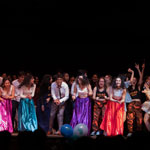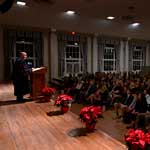
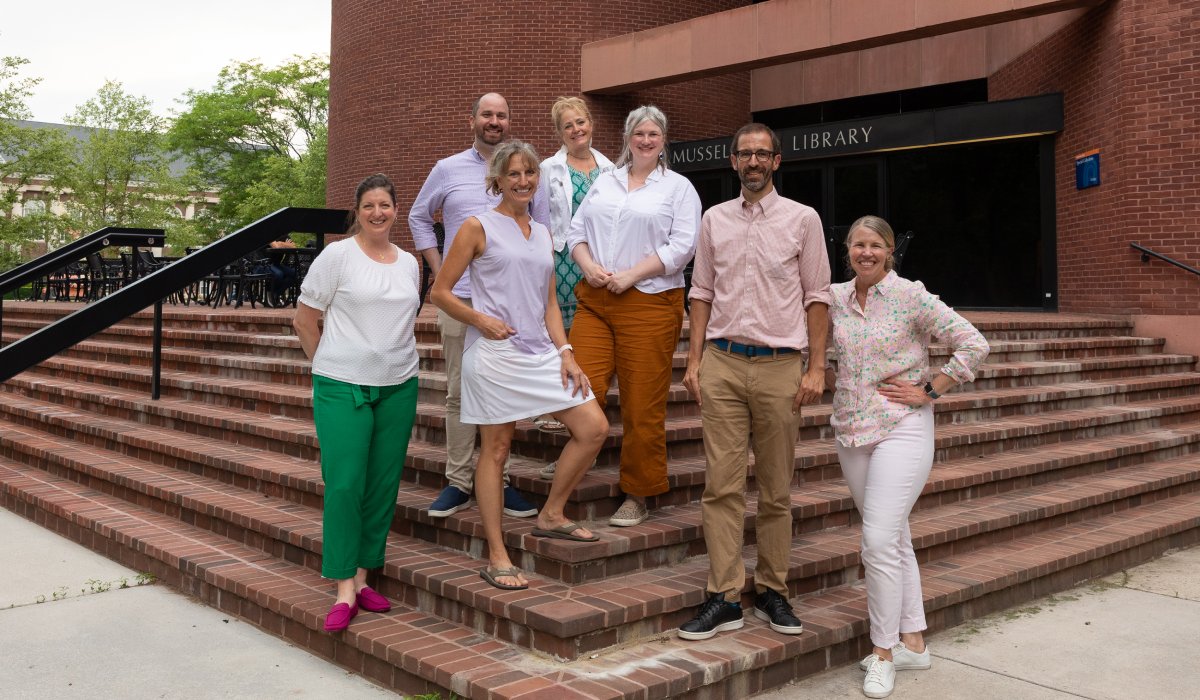
Eager to increase their effectiveness and efficiency in helping students learn and grow, 65 Gettysburg College staff, administrators, and faculty registered for the third annual June Pedagogy Institute (JPI), which took place at Musselman Library on June 16.
During the full-day immersive institute, attendees collaboratively worked toward optimizing learning environments for students and instructors by exploring students’ lives beyond the classroom—a topic that touches all areas of campus and was highly requested.
“Oftentimes in academia and elsewhere, the question is: ‘What else can I do?’ Or specifically in academia, ‘How can I best allocate my resources to best serve my students?’” said Josef Brandauer, health sciences professor and director of the Johnson Center for Creative Teaching and Learning at Gettysburg College, which hosted JPI. “Through diving deeper into those important questions, the follow-up is, ‘What are effective and efficient practices to do so?’ These are the questions we aimed to explore and provide guidance.”
Various panel discussions, followed by opportunities for questions, and breakout “consulting sessions” tackled a range of topics, including how to affirm and support LGBTQ students, how the Center for Student Success supports students, how the College can help international students feel included, how to assist students in times of need in and out of the classroom, and several others.
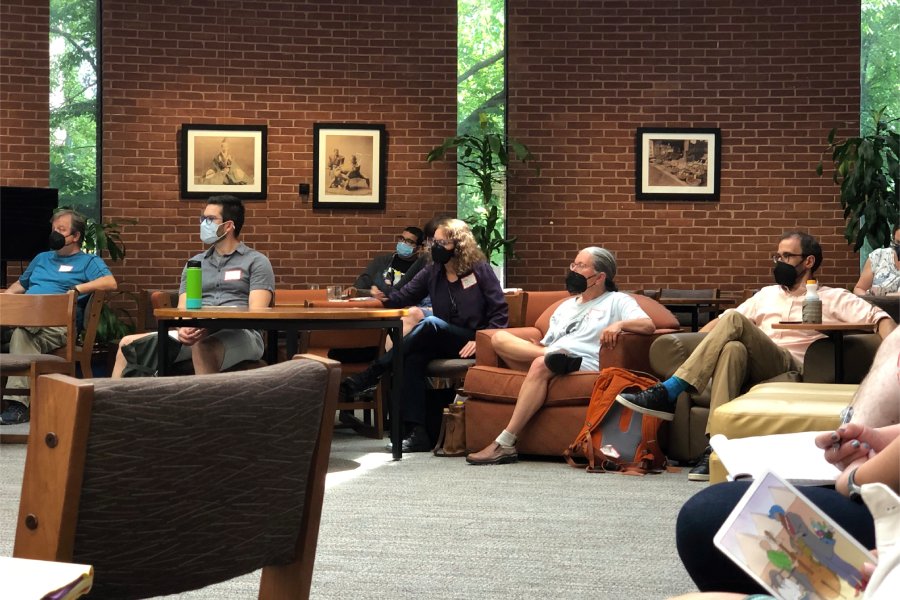
The opening panel, “The Life of a Gettysburg Student Outside of the Classroom,” welcomed nine panelists including College Chaplain and Director of Religious and Spiritual Life Bright, Associate Dean of College Life Jim Duffy, and Director of the Gender and Sexuality Resource Center Amanda Del Gaudio. Questions were bounced around the roundtable, reaping invaluable insight, on topics such as: “From your experience, how were students feeling last year?” and “What can we do to advance our student-centered mission?”
Some of the key action items identified through the first discussion were a universal desire to improve communication between faculty and student affairs, a commitment to assist students in building a narrative that connects academic experiences with extracurriculars, and as eloquently summarized by Bright, “encouraging students to think impossibly” in all interactions.
Prof. Rebecca Eckert, who joined the College’s Biology and Environmental Studies Departments last academic year, particularly enjoyed this session. Through JPI, she was hoping to get to know students and the Gettysburg community on a deeper level and apply her newfound knowledge to her lesson planning.
“I’m always looking for ways to increase my toolkit to better serve my students,” Eckert said. “This session affirmed just how important it is to listen, engage, and be in tune with students’ lives inside and outside of the classroom. It may seem simple, but it’s things like this—better understanding Gettysburg College students—that I believe can have a big impact in helping me be more effective in my teaching.”
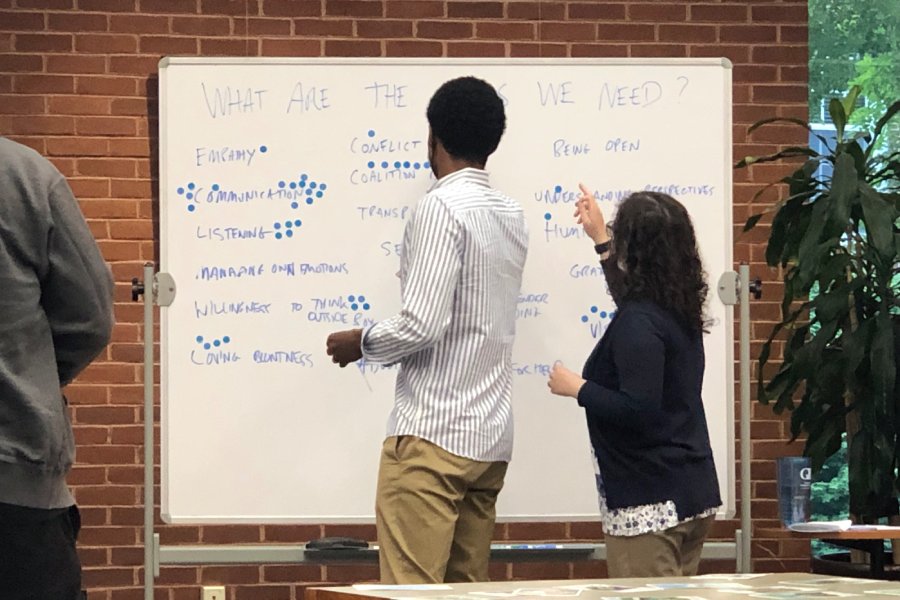
The day closed with an exploration of successful leadership characteristics—empathy, communication, active listening, gratitude, vision, transparency, conflict resolution, among others—and a guest session about inclusive learning, led by Marni Jones, dean and director of Dickinson College’s Access and Disability Services and SOAR (Strategies, Organization, and Achievement Resources). Jones introduced the Universal Design for Learning Framework, which she described as a way to encourage the development of flexible learning environments and spaces that accommodates individual learning differences.
“Why design something that’s not ideal for all?” Jones asked during the session. “Why make it accessible for those who need it after the fact?”
Jones further explained Universal Design solutions through several example scenarios—equipping faculty and staff to explore alternative solutions in their classrooms and workspaces that foster accessibility and inclusivity for all. For example, Jones suggested offering print materials or oral instructions digitally to all students prior to class, rather than sharing them only upon request.
“I learned a lot from the Universal Design session, and I am already thinking through how I might implement some of these inclusive strategies into my classroom next academic year,” said French Prof. Amgad Serour. “I signed up for JPI to learn new strategies and learn from the expertise of senior faculty and colleagues, and through the variety of sessions and perspectives, I’ve gained that and more.”
“I signed up for JPI to learn new strategies and learn from the expertise of senior faculty and colleagues, and through the variety of sessions and perspectives, I’ve gained that and more.”
– French Prof. Amgad Serour
At the core of it all—the reason why each individual took the initiative to spend a sunny summer day indoors learning—is the student. If attendees took just one thing away from JPI that will help them be more effective and efficient in their interactions with Gettysburg students, then Brandauer said it was a success.
“The central topic of JPI will always be the student. They’re the subject of every sentence, really,” Brandauer said. “When I reference the goals of being effective and efficient, what we mean is helping our students learn and grow. I think we worked toward that with great strides during this year’s JPI. We’re each a little bit more equipped to better serve our students.”
By Molly Foster
Photos by Shawna Sherrell and Molly Foster
Posted: 07/11/22

